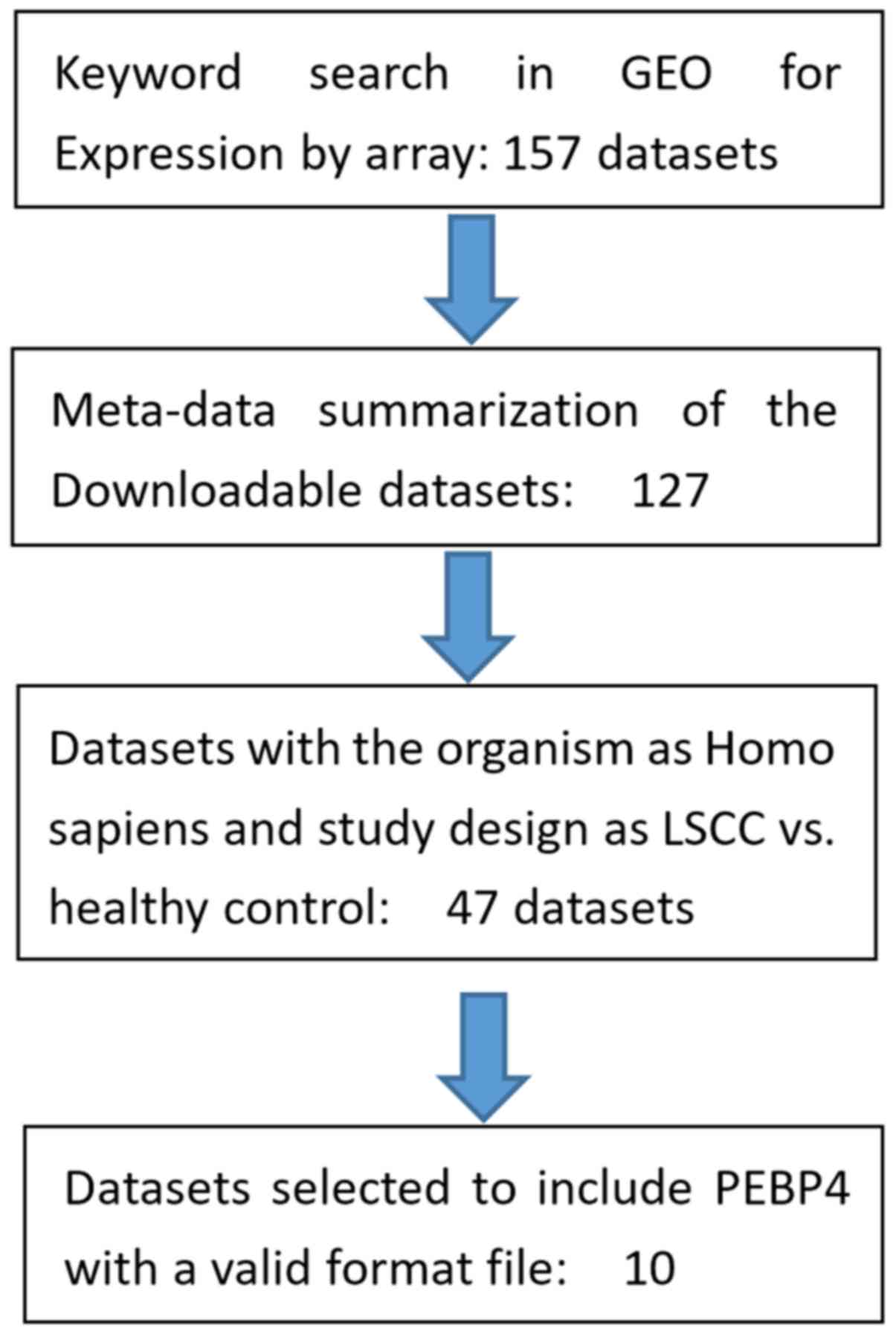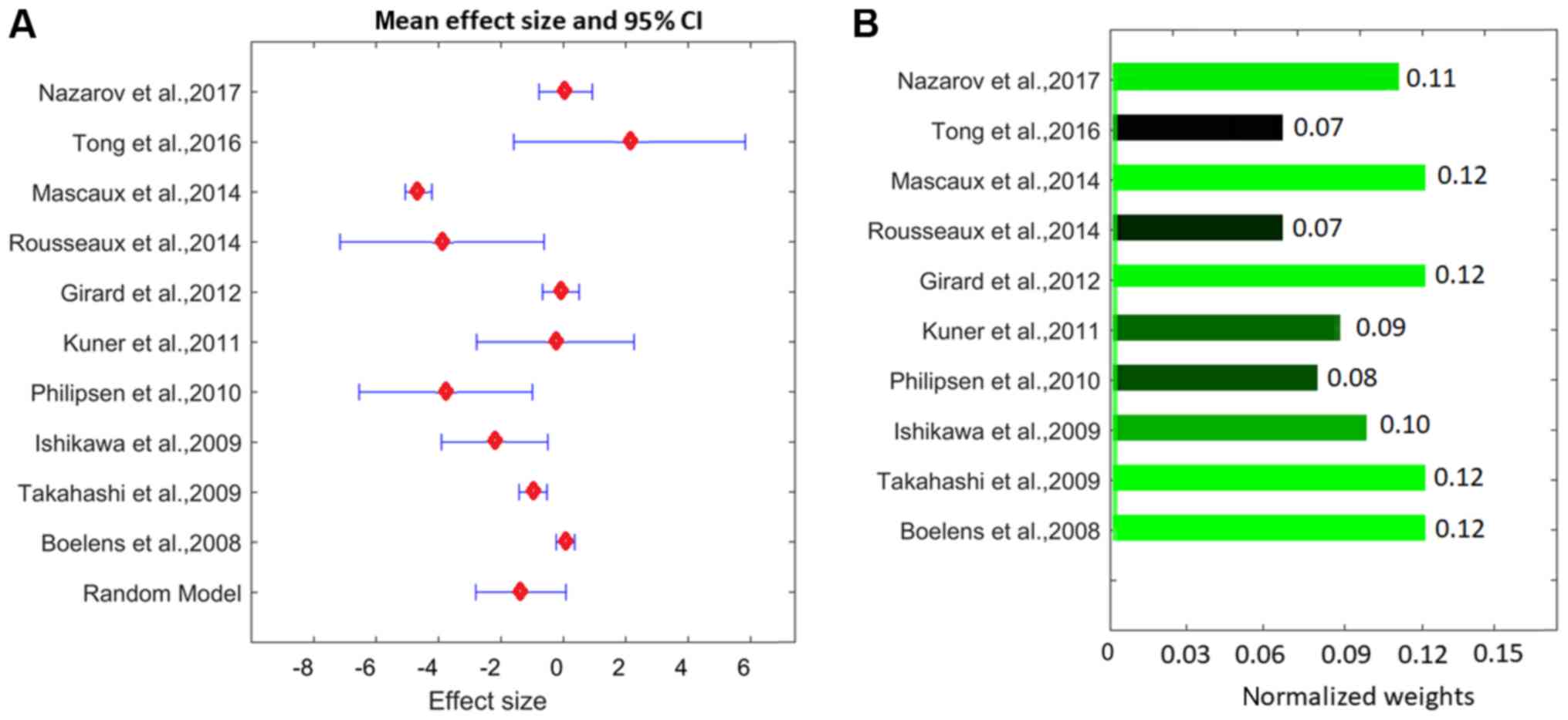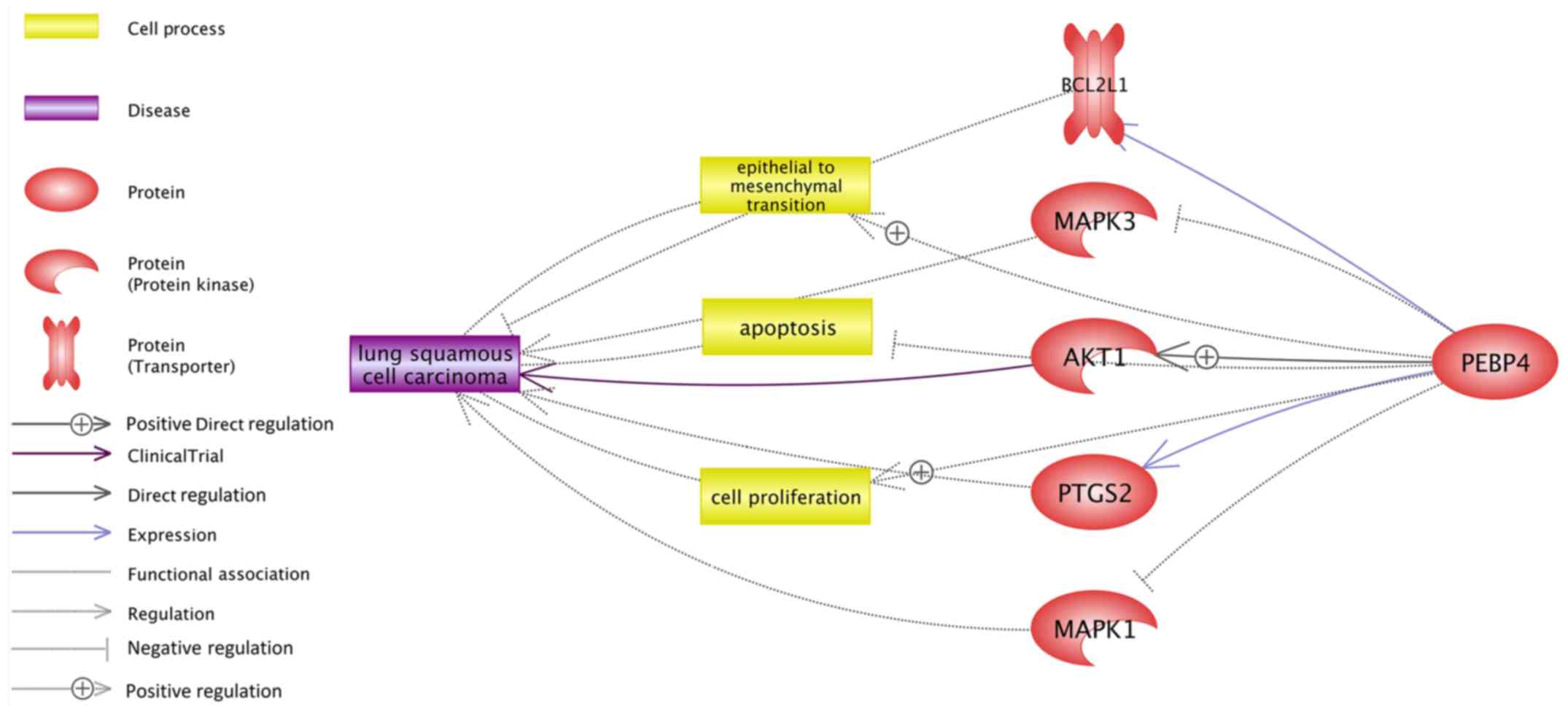|
1
|
World Health Organization International
Agency for Research on Cancer. GLOBOCAN 2012, . Estimated Cancer
Incidence, Mortality and Prevalence Worldwide in 2012. http://globocan.iarc.fr/Default.aspxJan
27–2015
|
|
2
|
Heist RS, Mino-Kenudson M, Sequist LV,
Tammireddy S, Morrissey L, Christiani DC, Engelman JA and Iafrate
AJ: FGFR1 amplification in squamous cell carcinoma of the lung. J
Thorac Oncol. 7:1775–1780. 2012. View Article : Google Scholar : PubMed/NCBI
|
|
3
|
Pirker R: What is the best strategy for
targeting EGF receptors in non-small-cell lung cancer? Future
Oncol. 11:153–167. 2015. View Article : Google Scholar : PubMed/NCBI
|
|
4
|
D'Angelo SP, Pietanza MC, Johnson ML,
Riely GJ, Miller VA, Sima CS, Zakowski MF, Rusch VW, Ladanyi M and
Kris MG: Incidence of EGFR exon 19 deletions and L858R in tumor
specimens from men and cigarette smokers with lung adenocarcinomas.
J Clin Oncol. 29:2066–2070. 2011. View Article : Google Scholar : PubMed/NCBI
|
|
5
|
Rekhtman N, Paik PK, Arcila ME, Tafe LJ,
Oxnard GR, Moreira AL, Travis WD, Zakowski MF, Kris MG and Ladanyi
M: Clarifying the spectrum of driver oncogene mutations in
biomarker-verified squamous carcinoma of lung: Lack of EGFR/KRAS
and presence of PIK3CA/AKT1 mutations. Clin Cancer Res.
18:1167–1176. 2012. View Article : Google Scholar : PubMed/NCBI
|
|
6
|
Li W, Dong Y, Zhang B, Kang Y, Yang X and
Wang H: PEBP4 silencing inhibits hypoxia-induced
epithelial-to-mesenchymal transition in prostate cancer cells.
Biomed Pharmacother. 81:1–6. 2016. View Article : Google Scholar : PubMed/NCBI
|
|
7
|
Li P, Wang X, Li N, Kong H, Guo Z, Liu S
and Cao X: Anti-apoptotic hPEBP4 silencing promotes TRAIL-induced
apoptosis of human ovarian cancer cells by activating ERK and JNK
pathways. Int J Mol Med. 18:505–510. 2006.PubMed/NCBI
|
|
8
|
Qiu J, Yang G, Lin A, Shen Z, Wang D and
Ding L: Human phosphatidylethanolamine-binding protein 4 promoted
the radioresistance of human rectal cancer by activating Akt in an
ROS-dependent way. PLoS One. 9:e900622014. View Article : Google Scholar : PubMed/NCBI
|
|
9
|
Yu G, Huang B, Chen G and Mi Y:
Phosphatidylethanolamine-binding protein 4 promotes lung cancer
cells proliferation and invasion via PI3K/Akt/mTOR axis. J Thorac
Dis. 7:1806–1816. 2015.PubMed/NCBI
|
|
10
|
Nazarov PV, Muller A, Kaoma T, Nicot N,
Maximo C, Birembaut P, Tran NL, Dittmar G and Vallar L: RNA
sequencing and transcriptome arrays analyses show opposing results
for alternative splicing in patient derived samples. BMC Genomics.
18:4432017. View Article : Google Scholar : PubMed/NCBI
|
|
11
|
Rousseaux S, Debernardi A, Jacquiau B,
Vitte AL, Vesin A, Nagy-Mignotte H, Moro-Sibilot D, Brichon PY,
Lantuejoul S, Hainaut P, et al: Ectopic activation of germline and
placental genes identifies aggressive metastasis-prone lung
cancers. Sci Transl Med. 5:186ra662013. View Article : Google Scholar : PubMed/NCBI
|
|
12
|
Byers LA, Diao L, Wang J, Saintigny P,
Girard L, Peyton M, Shen L, Fan Y, Giri U, Tumula PK, et al: An
epithelial-mesenchymal transition gene signature predicts
resistance to EGFR and PI3K inhibitors and identifies Axl as a
therapeutic target for overcoming EGFR inhibitor resistance. Clin
Cancer Res. 19:279–290. 2013. View Article : Google Scholar : PubMed/NCBI
|
|
13
|
Schuster K, Venkateswaran N, Rabellino A,
Girard L, Peña-Llopis S and Scaglioni PP: Nullifying the CDKN2AB
locus promotes mutant K-ras lung tumorigenesis. Mol Cancer Res.
12:912–923. 2014. View Article : Google Scholar : PubMed/NCBI
|
|
14
|
Kahn N, Meister M, Eberhardt R, Muley T,
Schnabel PA, Bender C, Johannes M, Keitel D, Sültmann H, Herth FJ
and Kuner R: Early detection of lung cancer by molecular markers in
endobronchial epithelial-lining fluid. J Thorac Oncol. 7:1001–1008.
2012. View Article : Google Scholar : PubMed/NCBI
|
|
15
|
Hou J, Aerts J, den Hamer B, van Ijcken W,
den Bakker M, Riegman P, van der Leest C, van der Spek P, Foekens
JA, Hoogsteden HC, et al: Gene expression-based classification of
non-small cell lung carcinomas and survival prediction. PLoS One.
5:e103122010. View Article : Google Scholar : PubMed/NCBI
|
|
16
|
Fujiwara T, Hiramatsu M, Isagawa T,
Ninomiya H, Inamura K, Ishikawa S, Ushijima M, Matsuura M, Jones
MH, Shimane M, et al: ASCL1-coexpression profiling but not single
gene expression profiling defines lung adenocarcinomas of
neuroendocrine nature with poor prognosis. Lung Cancer. 75:119–125.
2012. View Article : Google Scholar : PubMed/NCBI
|
|
17
|
Takeuchi T, Tomida S, Yatabe Y, Kosaka T,
Osada H, Yanagisawa K, Mitsudomi T and Takahashi T: Expression
profile-defined classification of lung adenocarcinoma shows close
relationship with underlying major genetic changes and
clinicopathologic behaviors. J Clin Oncol. 24:1679–988. 2006.
View Article : Google Scholar : PubMed/NCBI
|
|
18
|
Matsuyama Y, Suzuki M, Arima C, Huang QM,
Tomida S, Takeuchi T, Sugiyama R, Itoh Y, Yatabe Y, Goto H and
Takahashi T: Proteasomal non-catalytic subunit PSMD2 as a potential
therapeutic target in association with various clinicopathologic
features in lung adenocarcinomas. Mol Carcinog. 50:301–309. 2011.
View Article : Google Scholar : PubMed/NCBI
|
|
19
|
Boelens MC, van den Berg A, Fehrmann RS,
Geerlings M, de Jong WK, te Meerman GJ, Sietsma H, Timens W, Postma
DS and Groen HJ: Current smoking-specific gene expression signature
in normal bronchial epithelium is enhanced in squamous cell lung
cancer. J Pathol. 218:182–191. 2009. View Article : Google Scholar : PubMed/NCBI
|
|
20
|
Borenstein M, Hedges LV, Higgins JP and
Rothstein HR: A basic introduction to fixed-effect and
random-effects models for meta-analysis. Res Synth Methods.
1:97–111. 2010. View
Article : Google Scholar : PubMed/NCBI
|
|
21
|
Li F, Fang Z, Zhang J, Li C, Liu H, Xia J,
Zhu H, Guo C, Qin Z, Li F, et al: Identification of TRA2B-DNAH5
fusion as a novel oncogenic driver in human lung squamous cell
carcinoma. Cell Res. 26:1149–1164. 2016. View Article : Google Scholar : PubMed/NCBI
|
|
22
|
Jian W, Bai Y, Li X, Kang J, Lei Y and Xue
Y: Phosphatidylethanolamine-binding protein 4 promotes the
epithelial-to-mesenchymal transition in non-small cell lung cancer
cells by activating the sonic hedgehog signaling pathway. J Cell
Biochem. 120:5386–5395. 2019. View Article : Google Scholar : PubMed/NCBI
|
|
23
|
An LP, Maeda T, Sakaue T, Takeuchi K,
Yamane T, Du PG, Ohkubo I and Ogita H: Purification, molecular
cloning and functional characterization of swine
phosphatidylethanolamine-binding protein 4 from seminal plasma.
Biochem Biophys Res Commun. 423:690–696. 2012. View Article : Google Scholar : PubMed/NCBI
|
|
24
|
Li H, Wang X, Li N, Qiu J, Zhang Y and Cao
X: hPEBP4 resists TRAIL-induced apoptosis of human prostate cancer
cells by activating Akt and deactivating ERK1/2 pathways. J Biol
Chem. 282:4943–4950. 2007. View Article : Google Scholar : PubMed/NCBI
|
|
25
|
Li H, Chen F, Yu L, Liu M, Chen H, Zhang Y
and Liu X: Expression of inflammation related enzymes during
experimental rat lung carcinogenesis. Zhonghua Zhong Liu Za Zhi.
24:316–319. 2002.PubMed/NCBI
|
|
26
|
Weeden CE, Ah-Cann C, Holik AZ, Pasquet J,
Garnier JM, Merino D, Lessene G and Asselin-Labat ML: Dual
inhibition of BCL-XL and MCL-1 is required to induce tumour
regression in lung squamous cell carcinomas sensitive to FGFR
inhibition. Oncogene. 37:4475–4488. 2018. View Article : Google Scholar : PubMed/NCBI
|
|
27
|
Aruga N, Kijima H, Masuda R, Onozawa H,
Yoshizawa T, Tanaka M, Inokuchi S and Iwazaki M:
Epithelial-mesenchymal transition (EMT) is correlated with
patient's prognosis of lung squamous cell carcinoma. Tokai J Exp
Clin Med. 43:5–13. 2018.PubMed/NCBI
|
|
28
|
Yu G, Shen Z, Chen G, Teng X, Hu Y and
Huang B: PEBP4 enhanced HCC827 cell proliferation and invasion
ability and inhibited apoptosis. Tumour Biol. 34:91–98. 2013.
View Article : Google Scholar : PubMed/NCBI
|

















